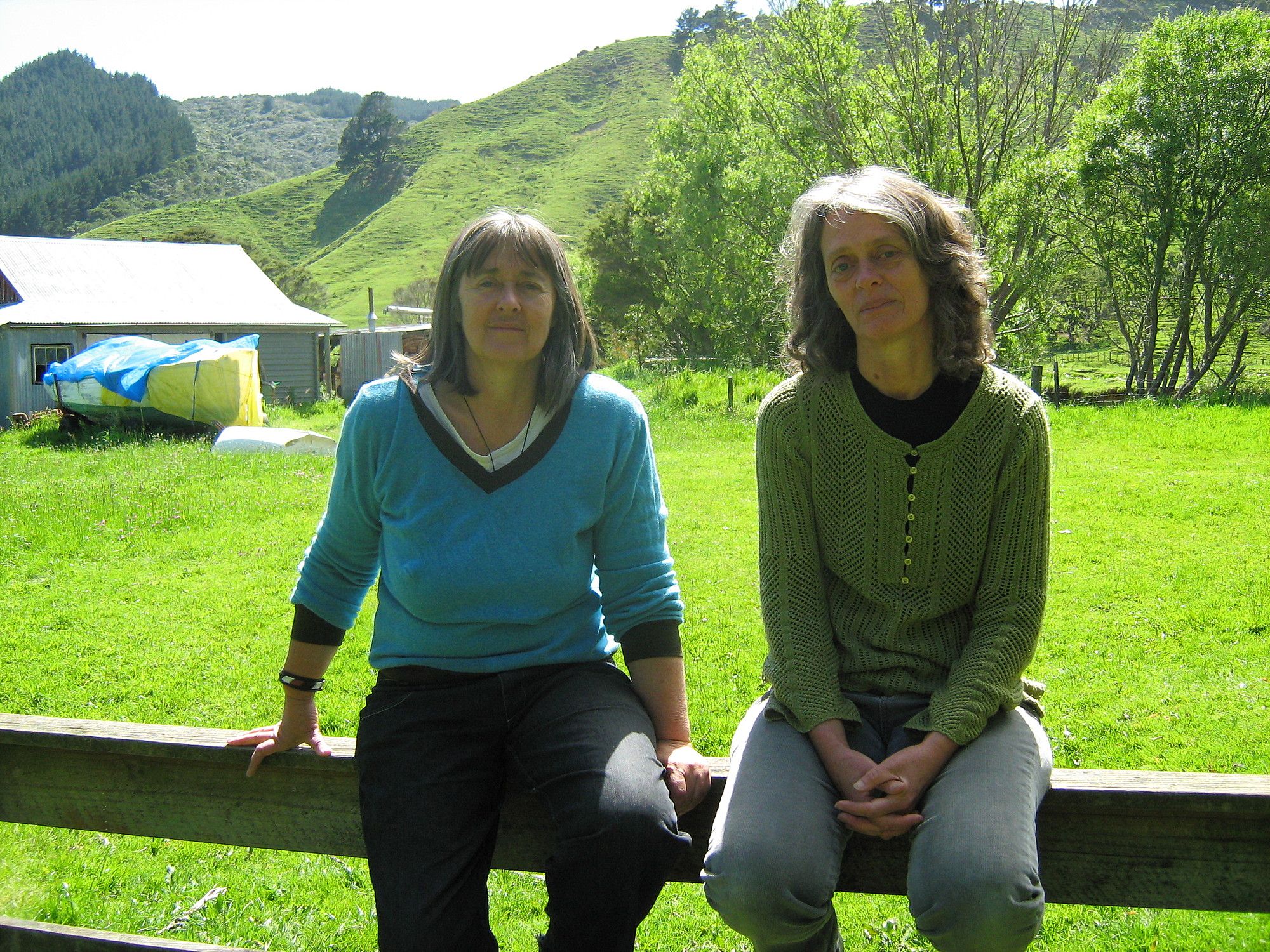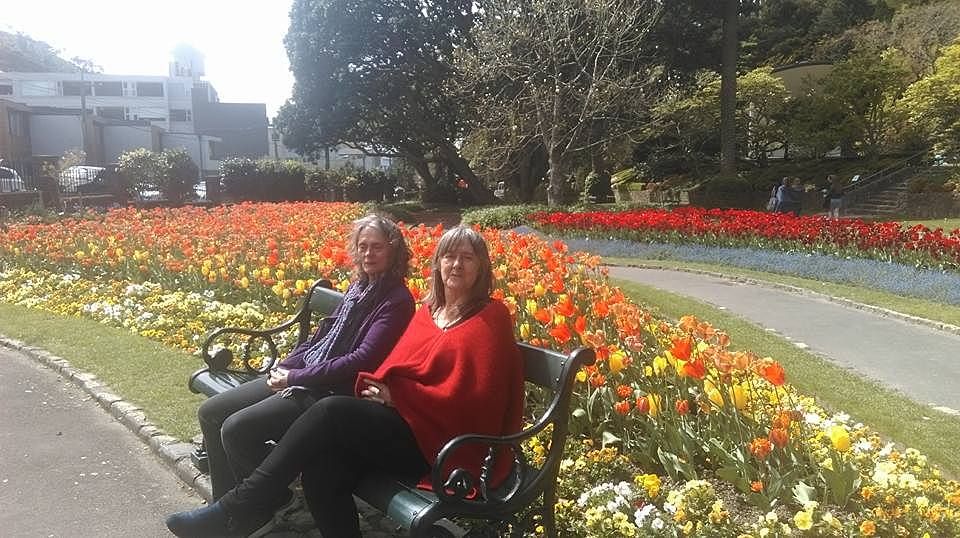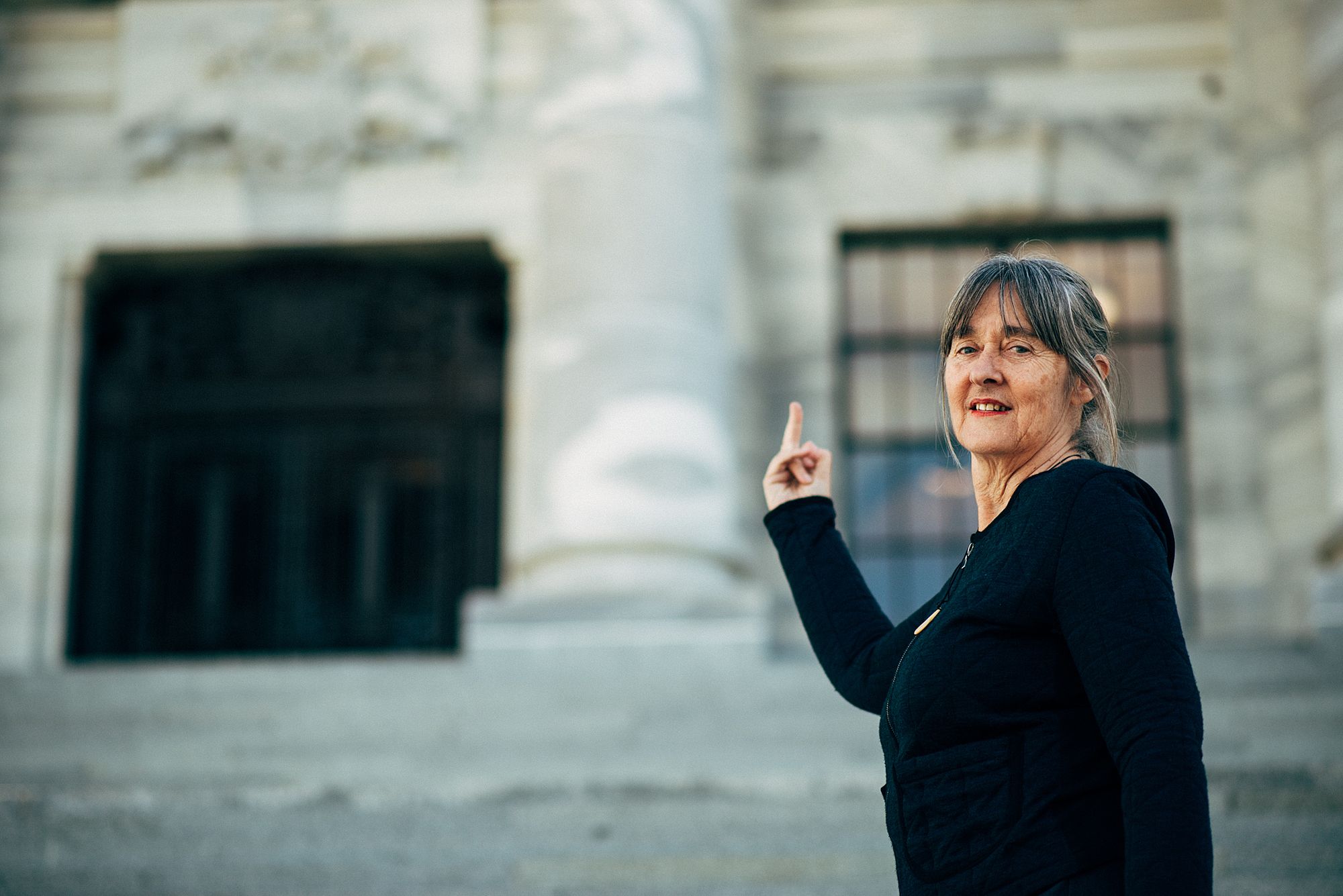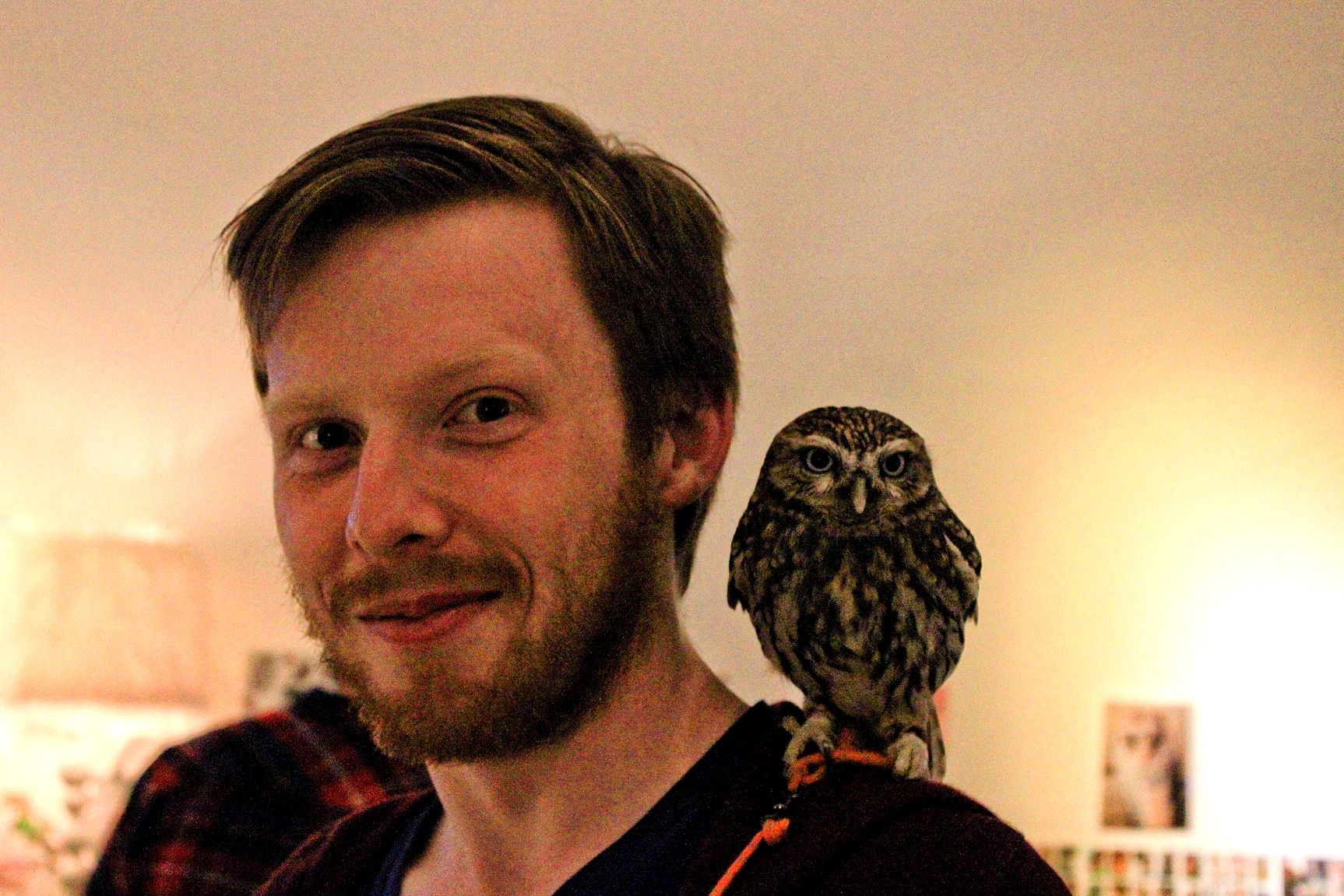The One-Day Spin: A Chat With Sarah and Catherine Delahunty
Adam Goodall catches up with two indomitable sisters, award-winning director and playwright Sarah Delahunty and former Green MP Catherine Delahunty, to talk about getting old, getting political, and the value of care.
Adam Goodall catches up with two indomitable sisters, award-winning director and playwright Sarah Delahunty and former Green MP Catherine Delahunty, to talk about getting old, getting political and the value of care.
Catherine and Sarah Delahunty don’t talk about their age, and how it’s changed their perception of the world around them, with any kind of romance. At 64 and 65 respectively, they’re quick to laugh at the things they find ridiculous and they don’t dance around things other people might find uncomfortable to talk about. “People like to laugh at me as a bit of an Eeyore,” Sarah tells me on a humid Wednesday afternoon, “because I just find life a bit of a desperate business on a daily basis.”
We’re meeting now in the National Library, a mausoleum of archival material – photos, diaries and articles about how long-dead and still-living New Zealanders dealt with their own desperate business. Catherine and Sarah stopped living together a couple of months ago: they had been flatmates since 2008, when Catherine was called to Wellington as a newly-minted Member of Parliament for the Green Party, but Catherine announced she wouldn’t be seeking re-election in 2017.
They’re no longer in the Thorndon flat that they shared together, hidden away down a leafy back-street off Tinakori Road. Catherine’s still in town for a bit, though – on December 7th, she takes the stage at BATS Theatre in Question Time Blues, a ‘satirical public detox’ from Parliamentary politics directed by her sister, who is also a prolific, award-winning playwright. But it’s impossible to disentangle that detox from the rest of their history and how they tell it.
“When you’re quite old,” Catherine tells me, “you have quite a few twenty year blocks, and it’s quite scary.” I ask Sarah if she’s found that as well. “I had a thirty year block of being at home with children,” she responds. “I seem to work more in thirties.”
Let’s go over those blocks. Born a year apart, Catherine – a timid child “who appeared to lack confidence”, she laughs – and Sarah – a natural director, even at that age – were always exceptionally close. Their life was steeped in politics: in her maiden speech as an MP, Catherine reflected on how she had first marched on Parliament “in a pushchair, protesting against nuclear weapons.” But outside of the agitating, they were both obsessive storytellers. They’d collaborate on characters and act out stories together – except for one summer, when Sarah determined that she would make Catherine into an athlete. “I used to make her get up at quarter to seven in the morning and come down the road,” Sarah recalls with some sadism, “and I’d chalk things out. And make her–” “Run,” Catherine finishes, laughing.
In her teens, Sarah joined the New Zealand Drama School but dropped out after ten days; it was “too boring”, she told the Dominion Post in 2010. She quickly fell into work at Wellington’s Downstage Theatre and, in 1974, landed a lead role on trailblazing New Zealand soap opera Close To Home (she’s amused at my suggestion she ‘skyrocketed’ to fame). She had her first child in 1978, her second in 1981. She wrote a play with songs about motherhood called Stretchmarks shortly after. Audiences across the country loved it, and it helped Sarah win the Bruce Mason Playwriting Award in 1987.
Catherine, on the other hand, moved quickly into activism. She started the Secondary School Students Association at age 14, the first high school student union in the country. It was an act so ‘radical’ that the SIS took note; her file starts with her asking a congress of adult activists for money to start a “high school revolution” (she raised thirty-two dollars). After high school, she moved to the Coromandel to “live with a mountain.” Sarah joined her, briefly, in the late 1970s, staying in a bus with her partner and their baby on Catherine and her then-husband’s property. Catherine had her daughter six months after Sarah’s arrival. “We stayed there for about nine months, ten months,” Sarah says.
“I think it would be fair to say,” Sarah says, “we both spent...” She trails off, looking for the best way to approach this elephant. “Retrospectively, I would say, we spent rather a lot of energy on the males in our lives that, looking back, didn’t seem to bring much reward.”
Catherine cracks up. “Perfect.”
“Men all had chainsaws and motorbikes but we were all scrubbing in the creek, which is why I only had one child at the time. Because it didn’t seem like much fun.”
Both Catherine and Sarah talk about the 1960s and 1970s as an ‘unreconstructed’ time in New Zealand, a time when feminist activism still picking up steam. “All over the country,” Sarah describes, “men were having a wonderful time at the expense of females.” Living relatively off the grid – Catherine’s home had electricity “at that point”, she half-jokes – their partners expected them to carry the household without complaint. “Men all had chainsaws and motorbikes but we were all scrubbing in the creek, which is why I only had one child at the time,” Catherine says. “Because it didn’t seem like much fun.”
The men in their lives – including their father, “who was a baby til he turned 80” – were exemplars of the social norm: men put next to no effort into their relationships, and women were obligated to accept that and have next to no expectations in return. The mere fact that Catherine and Sarah were feminist was enough to threaten that norm, and those men. “They didn’t like the fact that there was two of us,” Catherine says, “because we reinforced each other.”
Catherine goes on to explain that living with that lack of power and self-determination, backed into a mostly verbal resistance, has had a hand in how they approach their work and their activism. “It has informed, over time, a greater determination not to put yourself in a dependent position.” She believes things have gotten better since then. “Younger guys generally do a lot more with their kids and take a lot more responsibility.” But ‘better’ is by no means perfect. Perfect, Sarah says, might start with men shutting up for “at least a century”.
The sisters continued to visit each other for holidays and live together when they needed support. When Catherine moved to Wellington for a year to work for the Department of Conservation, they lived over each the fence from each other. But for the next block of twenty, they mostly lived apart. Sarah freelanced as a playwright, director and drama teacher, working almost exclusively with and for high school students on productions both grand (like Jesus Christ Superstar and Les Misérables) and intimate (such as performances of her award-winning plays 2b Or Not 2b and Eating the Wolf).
Catherine was an intensely active activist. She played a leading role in Coromandel Watchdog’s campaign against mining on the peninsula, at one point turning up to a mining industry reception at the Beehive and dumping a load of tailings from the Waihi Gold Mine right in the middle of it. She was a youth worker for the Thames-Coromandel District Council, a Greenpeace campaigner and a radical educator with Kotare Trust, coaching activists and other marginalised people in how to best agitate for social change.
“I do think we’re attracted to young people because they’re not as set and boring as older people,” Catherine says. “Yeah,” Sarah follows. “I feel like I still am a young person.”
“Me too, actually.”
They both laugh. “That’s a bit disturbing, isn’t it?”
Sarah is still making theatre, but stopped teaching regular drama classes for teenagers late last year. She talks about missing the spontaneity of those classes, the laughter in them. “The best things that have happened, creatively, have happened by accident in a drama class,” Sarah recalls. “I remember a teenager saying in my class once that ‘we defy all the rules here, even the rule of gravity’, and I really like that. Like, you could be anything. That was that feeling.”
“I’ve always felt very at home with younger people,” Catherine adds, “even though we’ve obviously [got] very different mores and music tastes and stuff, because they’re willing to take risks. And also feeling like I’m really more one of them—” She stifles a burp of laughter, its own little editorial note.
“She wouldn’t be going, like, ‘Oh wow how amazing you asked a question in the House today.’ It’d be like, ‘Oh, really? Oh, well, I looked after some children today.’ So it’s kind of a reminder that there are other values than being obsessed with your own political echo chamber.”
“I’ve always been the least-qualified adult in the room, because I have no university qualifications... Marama [Davidson, the Green MP] said to me, ‘You’re the youngest in the caucus,’ because I’m much more likely to behave in a stupid way, and to have jokes and be stupid, and young people like that but old people don’t. They don’t know how to join in. They’re scared. They get the sense of trying to be proper.”
They were still close during those years, even if they were mostly on opposite ends of the North Island. So when Catherine was elected to Parliament in 2008 and had to move to Wellington to play the role of Opposition, it was a no-brainer that Sarah would become her flatmate. “There was a lot in it for me,” Catherine says. “It was so great to have somebody who I could come home with, moan at them and carry on about what’s been going on.” Catherine turns to her sister. “And you looked after the house and put the bloody hottie in my bed on a cold winter night...”
“And I wasn’t overly interested, either,” Sarah adds, not being mean to her sister but not joking, either. Catherine saw that as an asset; Sarah gave her a way to ground herself after spending twelve hours a day on Parliament grounds. “She wouldn’t be going, like, ‘Oh wow how amazing you asked a question in the House today.’ It’d be like, ‘Oh, really? Oh, well, I looked after some children today.’ So it’s kind of a reminder that there are other values than being obsessed with your own political echo chamber.”
One of those values was the value of caring for others – not just in your politics, but in everyday life. That went well beyond what Sarah brought to the flats they shared over those eight years, Catherine stresses, well beyond the cooking and cleaning and companionship. Sarah was helping her daughter by looking after her kids for two days a week; she also adopted a geriatric cat and bought it a house in Paekakariki so that it could live a little. “I used to commute up there to look after the geriatric cat, clean up after it, then come down and clean up after Catherine.”
Sarah also spent a lot of time supporting their parents in their old age, the kind of work that, Catherine points out, isn’t traditionally valued in society. “When we first started [living together], our parents were alive, and my mother had dementia,” Sarah says. “We had to go through the whole thing with her going into hospital. Then my father died and she was still alive, and I was the person who took on not working and doing a lot of that stuff.”
Their father had to learn a lot from the way his world had changed, and Sarah’s support, Catherine explains, played a key role in his learning. “He had these belief systems around social change and being an activist,” she elaborates, “[but he] learned from Sarah eventually... that you need to care for other people, and that your family really matter.” She laughs a little at this. “It took him until he was 80 to get that. And we were lucky that Sarah put the time in to both support our parents and educate my dad about that.”
That’s not to say Sarah’s not political, though. Far from it. It’s just that there’s a lot that passes unsaid when you know each other so well. “When you’re family and when you both believe that society’s not in a good space, you don’t have to talk about what’s wrong with the patriarchy and capitalism,” Catherine points out. “Because we know!”
“We’ve never been able to settle for the personal, like so many people do,” Sarah says, putting a lot of stress on the line. “We’ve always had the bigger picture, the structures.” That bigger picture, and the ways that Parliamentary politics warp the lens through which you view it, is something that Catherine’s been vocal about since announcing that she was stepping down from Parliament. “This place creates an unusual and somewhat delusional experience of power,” she said in her valedictory last August, “and we must be held to account, for our own sake, as well as for the country.”
The way they describe it, though, Question Time Blues is less an act of holding Parliament to account – something Catherine has a lot of experience in – and more like an exorcism, using poetry, comedy and storytelling to expel the demons that followed her from the halls of Parliament Buildings. “I’m out of my comfort zone. I’ve written a lot of words that I don’t know how to say, I’ve put myself into a space where I don’t know how to be, and I can’t play anyone except myself – which is lucky because the play is me playing myself.”
“We’ve never been able to settle for the personal, like so many people do. We’ve always had the bigger picture, the structures.”
Parliament as theatre is a tired metaphor, I’ve found, one that’s rolled out so often by politicians and political editors that three separate MPs can use it in the space of an hour and it doesn’t seem at all weird. But there is a difference between the two, one that’s not really spoken to that often. Theatre makes you, the performer, vulnerable. Parliament makes you, the person, a performer.
A theatre is, generally, a supportive space. At the very least, no-one buys a ticket to your show because they want to see you fail. Parliament is an arena, an institution that neither values nor rewards vulnerability. The type of performance that is valued and rewarded often involves bullying, evasiveness and an almost-sociopathic distance between the MP and their audience, the general electorate. You simply can’t be vulnerable when ‘the game’ rewards your ideological opposites for mercilessly attacking that vulnerability. So when people say Parliament is theatre, they use it as an excuse, a way to diminish it as a record of positions taken and as a tool of transparency and accountability. When people say Parliament is theatre, they mean that it’s a place where people pretend they aren’t people.
Catherine’s conscious of the pressure that Parliament puts on people, forcing them to pretend to be impervious warriors in order to survive. In theatre, she says, almost excited by the difference, it’s so often the opposite. That’s especially so when you’re writing and performing work about your own experiences. “It’s less of a smokescreen,” says Sarah. Which is why having someone around to hold you accountable – in particular, a director who just isn’t that interested in politics – is so valuable. “I’ve got this tenacity about finishing things and about the detox I need to do, but it’s really amazing to have my sister actually say, ‘Well, you can say the line like this and people might actually get it.’”
All of that is true even given that what they’re building is just one version of Catherine’s story, a story that could be told a hundred different ways. This way is honest, mind. It has to be. “[Sarah] says things like, ‘would this person have actually said that or is this just you?’ and actually I have to admit sometimes it’s me,” Catherine describes. “And that’s good, because if I’m doing something that’s about someone else I want it to be true.”
But as you get older, Sarah tells me, you become adept at ‘spinning a line to yourself’. She stops herself; slows down; breathes out a resigned “yeah”. She breaks the eye contact she’s been holding pretty steadily up to now, concentrating on the emotional weight of her thought. “You can kind of choose what to believe, in the end,” she says, “and in the end, it doesn’t really matter.”
Sarah points to her own story. “I can think the fact that I’ve tried to stay in the background and being support, etcetera, is because I was the eldest daughter who took on my mother’s complete lack of feeling that she had a right to be alive, really. And I can see it as quite a negative thing.
“There was a basic disappointment in my life when I got to about eleven and realised that being female meant that I wasn’t going to be any of the people that I thought I would in all the books and games and stuff that happened in my head when I was young, because they were males. And I didn’t have another plan and I didn’t have a way of relating to being female and also being a person who did stuff... and it’s only now that I’m old that I feel like that person again. Now that I’m not noticed by anybody in any way as a female. I can feel like that person who might have had all sorts of adventures, only I’m a bit old and I can’t see and I can’t hear and one of my feet hurts.
“It’s just the story. There are multiple stories it could be."
“That’s the one-day spin. But there are moments when I’ve been a director, moments when something I’ve done had worked – moments within a night, I mean – moments when you go yes, and it feels like that happened...
“And then, on the other hand, I’ve just spent the morning with my nearly three year old grandson, doing very unglamorous stuff, crawling around on the floor, tying different tow-trucks to bits of cart and putting animals in them and pulling them around. And he will just say something, he’s the funniest, sweetest, most self-possessed little... yeah, and it’s just like, would I really have rather done anything else?”
She pauses, laughs. “This is feeling like I’m sitting on some kind of psychiatrist’s couch. I’m going to be quiet now.” Catherine laughs with her – “No, it’s interesting! To hear what people...” She trails off, like her sister knows what she means.
“The reason I’m… you know, none of that is true,” Sarah says, tying it off. “It’s just the story. There are multiple stories it could be. And it’s actually none of them, really.”
Question Time Blues runs from 7 to 9 December at BATS Theatre. Tickets available here.





